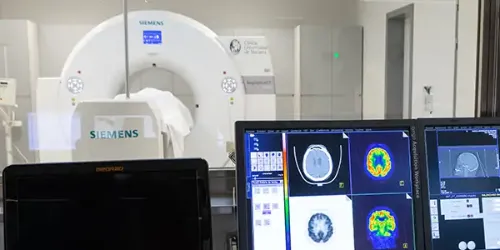Prion diseases
"Dementias due to prion diseases require early specialized consultation is essential to detect potentially treatable causes and implement effective treatment".
DR. MARIO RIVEROL
SPECIALIST. NEUROLOGY DEPARTMENT

Prion diseases and other rapidly progressive dementias are diseases that produce a cognitive and/or behavioral impairment that progresses to dementia in less than a year, although in most this progression occurs in weeks or a few months.
An adequate diagnosis is essential since, in a percentage of the cases, they are treatable and potentially curable.

What are the symptoms of a prion disease?
The symptoms of these diseases are very varied, but the common to all of them is the cognitive and/or behavioral deterioration of rapid evolution, which incapacitates the person in a few weeks or months.
The prion diseases usually begin with nonspecific symptoms like alterations of the spirit, upheavals of the dream, irritability or loss of weight.
Later, the dementia normally appears associated with upheavals of the movement like parkinsonismo, mioclonías or alterations of the march.
The most common symptoms are:
- Cognitive impairment.
- Behavioral impairment.
Do you have any of these symptoms?
You may have a prion disease
What are the causes of prion diseases?
They can be due to multiple causes, including neurodegenerative, autoimmune, infectious diseases, toxic-metabolic processes and vascular or brain tumor lesions.
One type of disease that typically produces rapidly progressive dementia is prion disease.
They are rare neurodegenerative diseases (incidence: 1 - 1.5 cases per million inhabitants per year), which are produced by the abnormal accumulation of prion protein.
They can occur by three mechanisms: 1) spontaneously (sporadic); 2) genetically (by mutations of the PRNP gene); and 3) acquired (infectious or iatrogenic).
- Sporadic forms are the most frequent, among which sporadic Creutzfeldt-Jakob disease stands out.
- In the genetic forms, fatal familial insomnia and familial Creutzfeldt-Jakob disease are included.
- The acquired forms are the rarest and include the new variant of Creutzfeldt-Jakob disease and iatrogenic Creutzfeldt-Jakob disease.
How is a prion disease diagnosed?

The diagnostic approach, in addition to the detailed anamnesis and neurological examination, requires the performance of multiple studies.
These include a complete blood and urine analysis, cerebral MRI, electroencephalogram and, usually, analysis of the cerebrospinal fluid.
Functional neuroimaging studies such as PET are often used.
In the case of suspicion of a prion disease, the analysis of cerebrospinal fluid obtained by lumbar puncture is key since it allows the diagnosis to be confirmed by determining prion protein in cerebrospinal fluid.
How is a prion disease treated?
The treatment of rapidly progressive dementias will depend on its cause.
Unfortunately, we do not have a curative treatment for prion diseases. However, up to 25% of the remaining cases are due to a treatable and potentially curable disease, usually of autoimmune, metabolic, infectious or tumorous cause.
Therefore, a main objective is always to identify entities that can be treated.
The Department of Neurology
of the Clínica Universidad de Navarra
The Neurology Department has extensive experience in the diagnosis and multidisciplinary treatment of neurological diseases.
We offer a diagnosis in less than 72 hours, along with a proposal for personalized treatment and post-consultation follow-up of the patient by our specialized nursing team.
We have the most advanced technology for an accurate diagnosis with cutting-edge equipment such as HIFU, deep brain stimulation devices, video EEG, PET and epilepsy surgery, among others.

Why at the Clinica?
- State-of-the-art diagnostic assistance with great work in research and teaching.
- Specialized nursing team.
- We work together with the Sleep Unit.

















